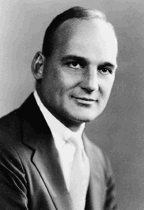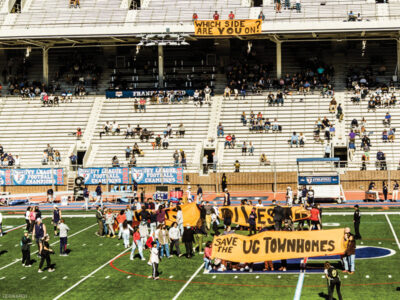Recalling Penn’s Unsung Savior.
By Dan Rottenberg

It was Penn’s Year of the Witches, better known as 1953. The football team, lacking athletic scholarships or spring practice, awaited a fearsome schedule that included Notre Dame, Ohio State, Penn State, Army, Navy, and Michigan but none of Penn’s traditional Ivy League rivals other than Cornell. George Munger, Ed’33, Penn’s legendary coach, had submitted his resignation in protest. Athletic director Francis T. Murray, C’37, who drew up the suicide schedule, had been fired. President Harold Stassen, Hon’48, the architect of this whole nightmare, had slipped off to a government job in Washington, D.C.
Most alarming, America’s oldest and most reputable universities were about to formalize their relationship through a sports conference called the Ivy League — and, thanks to Stassen’s experiment in big-time football, Penn seemed likely to be excluded. The seven other Ivy schools doubted that Penn would live up to the new league’s principles, which required above all that athletics be controlled by academic authorities.
Penn’s new president, the eminent physicist Dr. Gaylord P. Harnwell, Hon’53, was determined that Penn be as famous academically as it had been athletically. Membership in the Ivy League was critical to his strategy.
To achieve this mission, Harnwell summoned a man who was equally at home with scholars and athletes. Jeremiah Ford II, C’32, G’42, had played football and baseball at Penn while earning top grades in his English literature major. He had taught English and coached football at Hobart College and at St. George’s School in Newport, R.I. He had also experienced firsthand the exploitation of college athletes. “I made up my mind as an undergraduate,” he recalled years later, “that if I ever had anything to do with Pennsylvania athletics, nobody would be brutalized, no one would be used as we were used.” Ford had served as a Navy gunnery officer during World War II and had been recalled to the Navy when Harnwell tapped him as Penn’s athletic director.
Few people have risen to a challenge with greater success and less appreciation. Thanks to Jerry Ford’s behind-the-scenes lobbying over the next 12 months, Harnwell was included among the eight presidents who signed the landmark Ivy Group agreement of 1954. But Penn was accepted into this elite circle only after Ford gave his personal pledge that Penn would live up to both the letter and the spirit of the Ivy code.
By his faithful adherence to that pledge over the next 13 years, Ford became the most respected and forceful spokesman for Ivy principles. To Ford, the conventional mantra that athletics build character was “a lot of crap,” as he once remarked to me. “You can’t build a kid’s character by exposing him solely to athletics, any more than you can by locking him in a room with The Encyclopaedia Britannica. You can build it by exposing him to a wide variety of educational experiences — and athletics is certainly one of these, but only one. And you can build it by seeing that people make the most of their experiences.”
In effect, Jerry Ford enriched every Penn degree with educational benefits and Ivy prestige worth tens of thousands of dollars. But, within his own house, Ford was inevitably blamed for Penn’s fall from Eastern football prominence. In the 65 seasons before his arrival, only three Penn football teams lost more games than they won; during Ford’s 14-year tenure, only one Penn football team won more games than it lost.
When Penn’s athletic alumni finally engineered his dismissal in March 1967, Ford was characterized as a chronic loser. Yet during his tenure, Penn produced nationally ranked teams in seven sports, developed modern facilities for squash and tennis, and eliminated the distinctions between “major” and “minor” varsity sports.
After his firing, Ford ran a proprietary electronics school in Kansas City, Mo., before retiring to Arkansas in 1972. His death in December 1997 at age 87 went largely unnoticed in Philadelphia (and, indeed, in the Gazette). Yet it’s no exaggeration to suggest that the seeds of a university that today ranks sixth in the U.S. News & World Report national ratings and attracts more than 16,000 freshman applications a year were planted during those tense months when Jerry Ford maneuvered Penn’s acceptance into the Ivy League. Although Penn never formally expressed its gratitude to Ford while he lived, it’s not too late to acknowledge, finally, what he really was: a winner, in the best sense of the word.
Dan Rottenberg, C’64, is the author of seven books, including Fight On, Pennsylvania: A Century of Red and Blue Football and most recently The Inheritor’s Handbook (Bloomberg Press). As a Penn undergraduate, he played football and was sports editor of The Daily Pennsylvanian.




